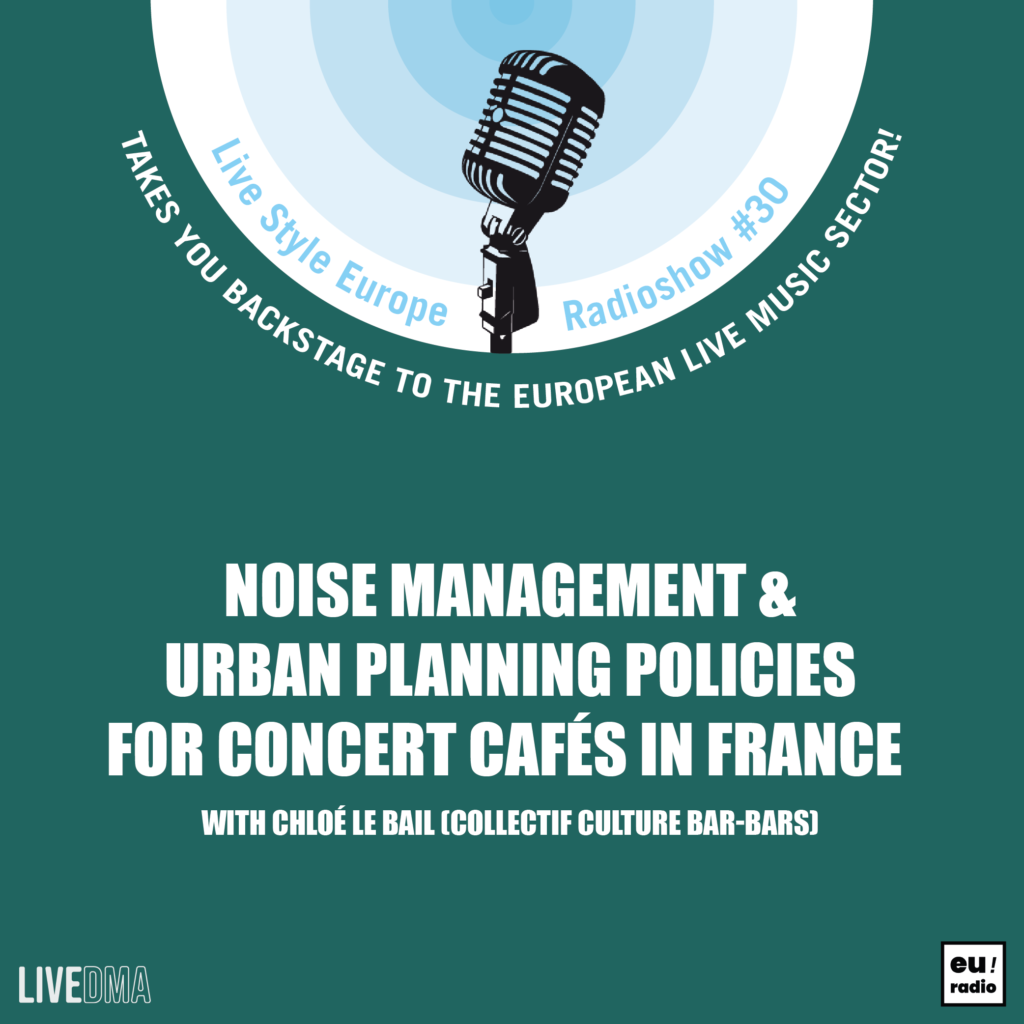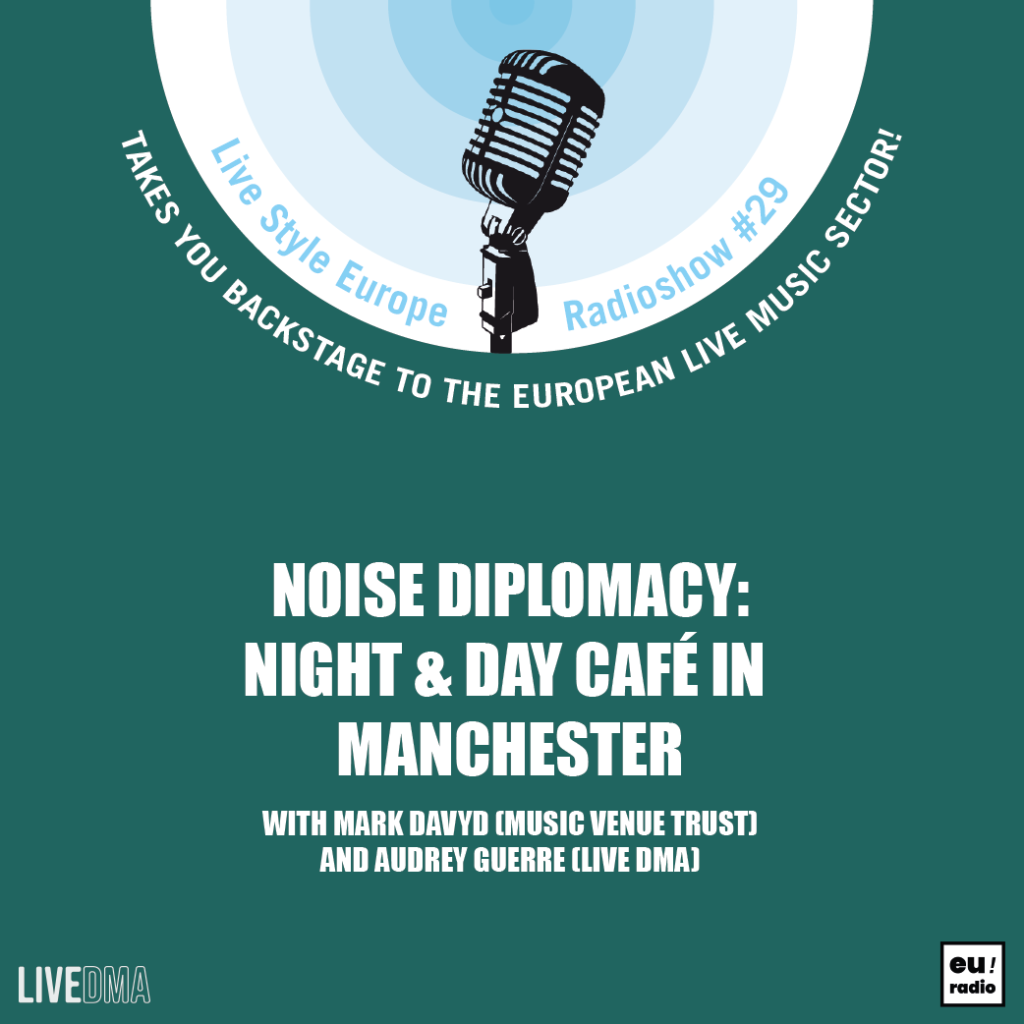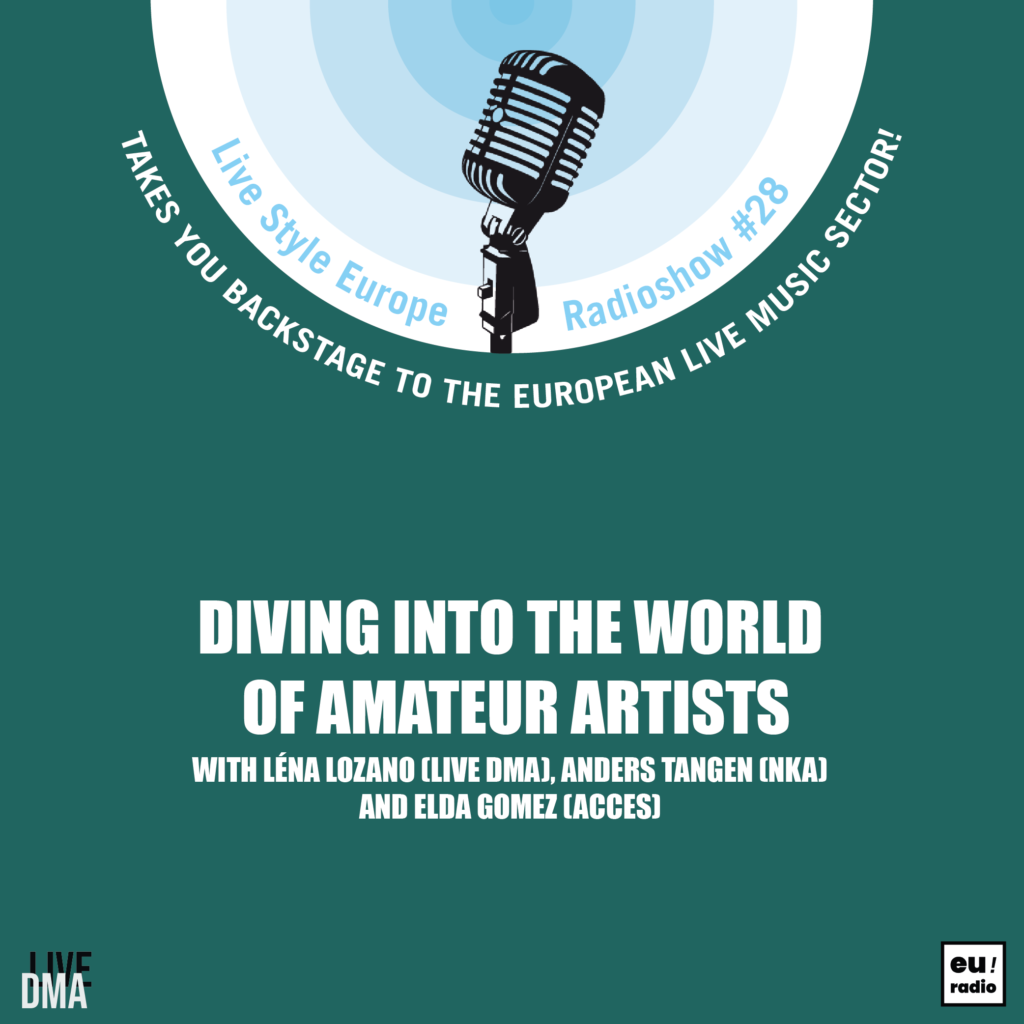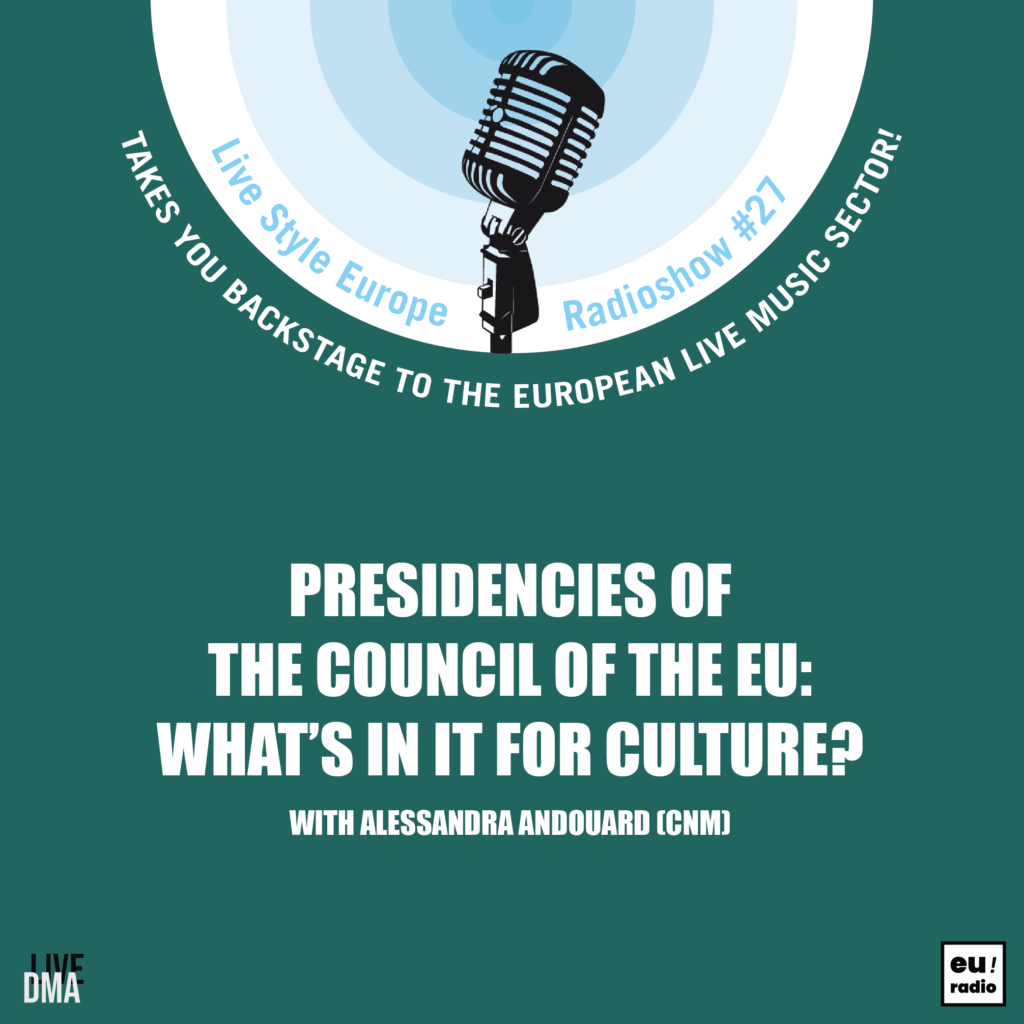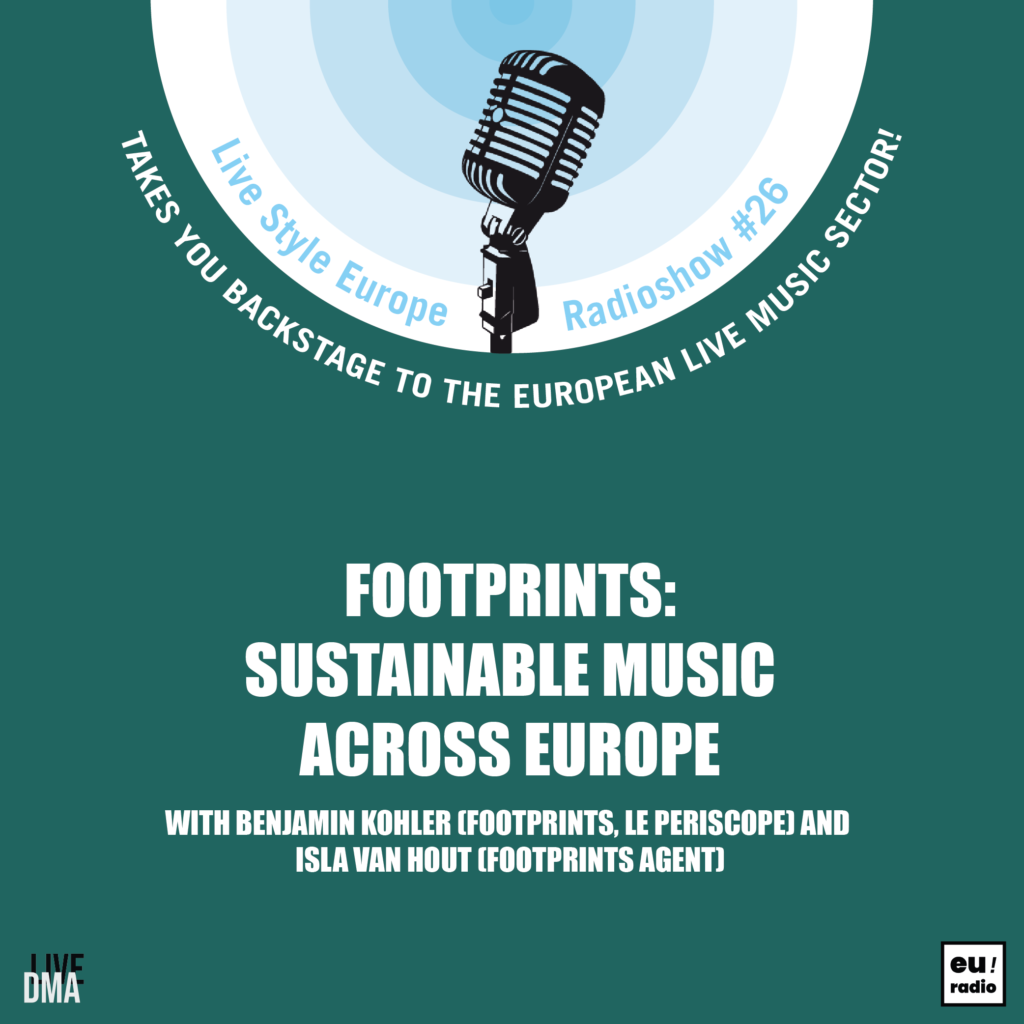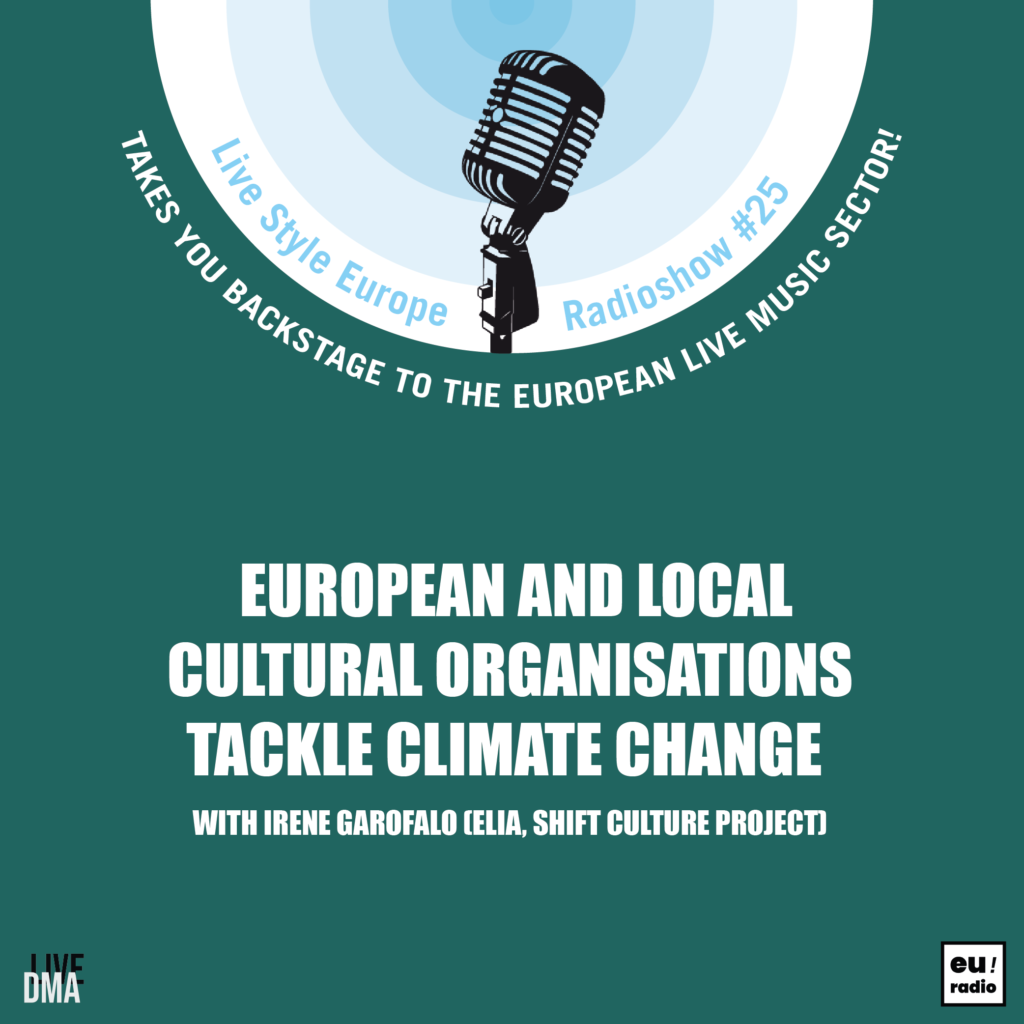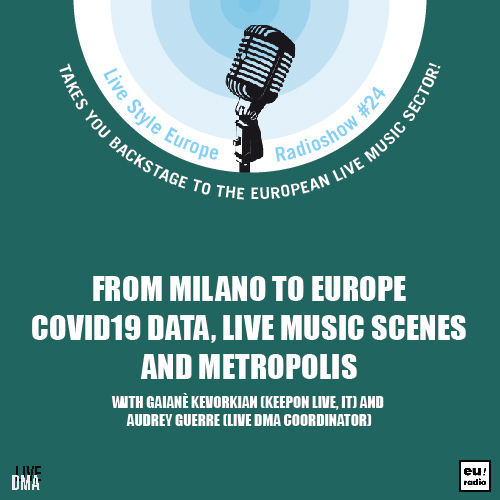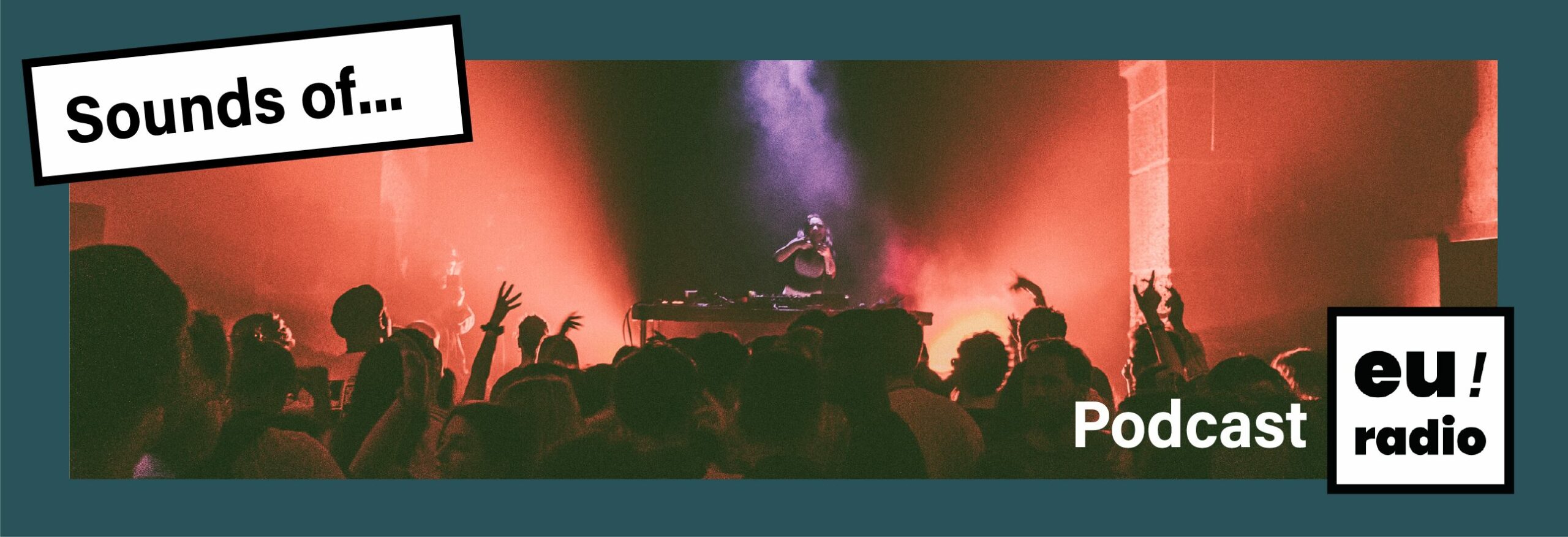
SOUNDS OF… LIVE MUSIC VENUES
Live DMA presents Sounds of live music venues! Embark on a journey into some of the coolest live music venues in Europe: discover their stories, what the cities’ local music scenes sound like and learn more about the places where music becomes alive.
You’re listening to Sounds of Live Music Venues, the radioshow made for and by concert enthusiasts. In each episode, we take you on a trip to a different city in Europe, to enter the doors of some of the coolest live music venues there. We will meet some of the people who work passionately hard to bring people together around live music.

EPISODE 6
Stay tuned!

EPISODE 5
Stay tuned!

EPISODE 4
Guest: Thomas Konings, Programmer at Botanique, Brussels (BE)
This new episode of Sounds of music venues brings you to Brussels, the capital city of Belgium. Our radioshow made for and by concert enthusiasts takes you to Botanique, one of Brussel’s most iconic venue. The 40 years old venue encompasses three concert halls going from 200 capacity to 650 capacity, as well as a museum area and a unique view on the Brussel botanical gardens.

EPISODE 3
Guest: Benjamin Jobin, Administrative and Financial Manager at Le Grand Mix, Lille (FR)
This episode takes you to the venue Le Grand Mix in Tourcoing. Organising concerts and supporting local artists since 1997, Le Grand Mix is a venue is involved in social & cultural actions, which always works with sustainability in mind, and values European cooperation.

EPISODE 2
Guest: Jaani Haapasalo, Head of Programme at G Live Lab, Tampere (FI)
This episode takes you to Tampere, the second biggest city in Finland, who is proud to be the one with the most live music venues per inhabitants. We met Jaani Haapasalo, head of programme at G Live Lab Tampere, an old industrial brick building, by the river, which was turned into a high-quality and cosy music venue with a state-of-the-art sound system.
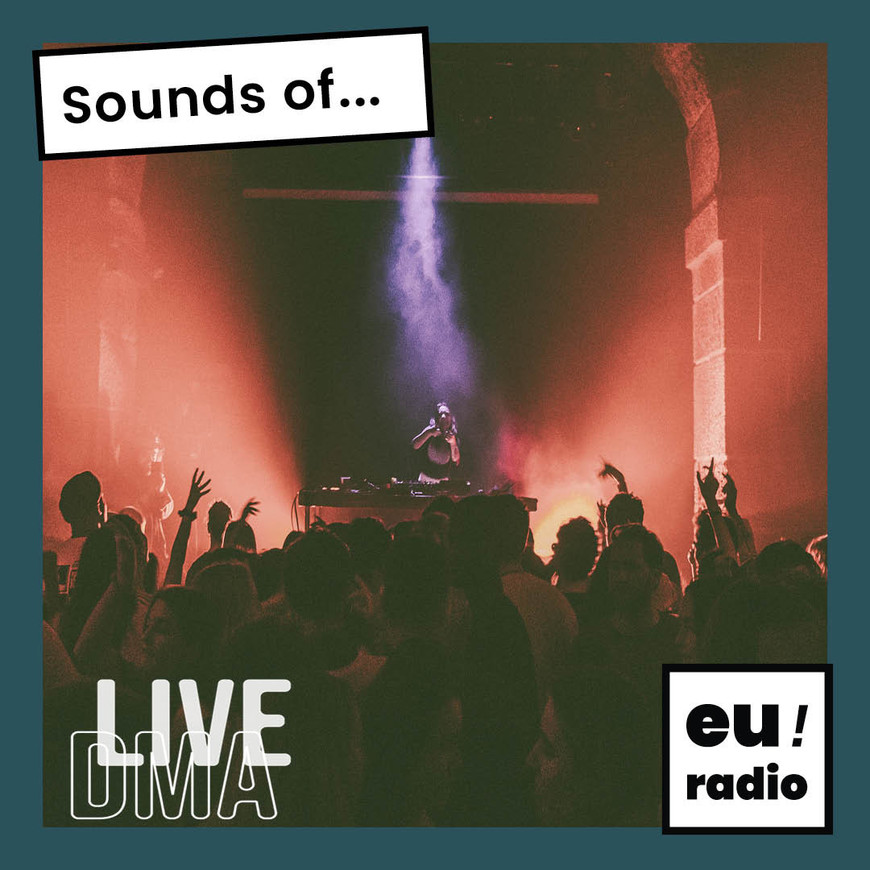
EPISODE 1
Guest: Joao Nogueira, Floor manager at MusicBox, Lisbon (PT)
This first episode takes you to the Portuguese capital: Lisbon. On one of the busiest nightlife street of the city, there is this really nice music venue called Music Box. We met Joao Nogueira, Floor Manager of the music venue. We talked about the history of Music Box, Joao’s relationship to it and Lisbon’s local music scene.
LIVE STYLE EUROPE PODCASTS · S2
Live Style Europe radioshow is our monthly podcasts recorded and broadcasted by Euradio in Nantes, France. Euradio is a unique associative, citizen and independent radio station: local-European, they put the news of the territory in front of the European’s, talking about what is happening in Europe today and what is in store for the future.
Each month, we invite a live music expert from our network to discuss topics that caught the attention of the European music industry: from policies and regulations, over European cooperation projects up to initiatives that shake up the music sector in Europe! You can also expect news on topics and challenges that our members are dealing with on a national level.
Tune in to the LIVE STYLE EUROPE radio show to be up to date on the latest evolutions of the European live music industry!
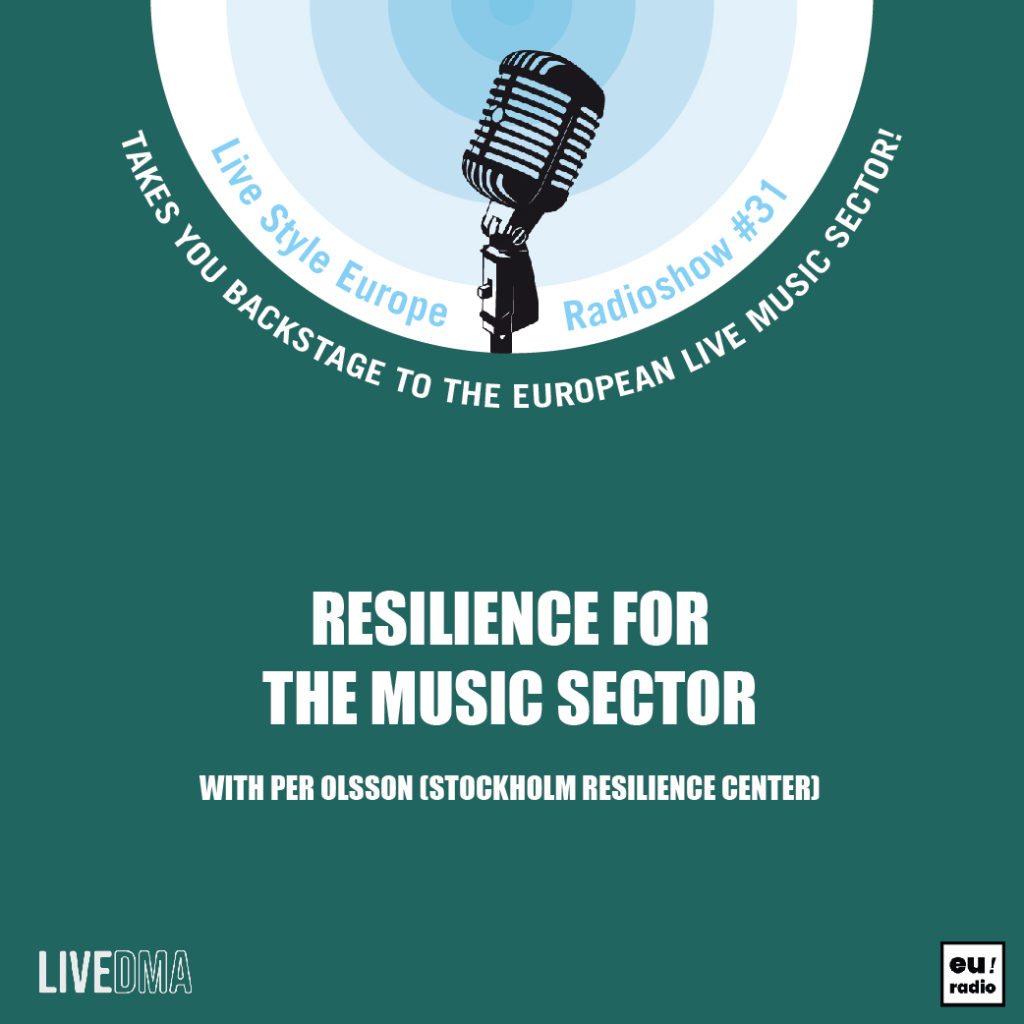
EPISODE 31
Guest: Per Olsson, Stockholm Resilience Center
In this episode, we will delve into the notion of resilience (the capacity to adapt and transform in the face of change). We will be together with Professor Per Olsson, Researcher at Stockholm University. He will help us understand how Resilience Studies can provide useful analysis to decipher the current changes facing music ecosystems.
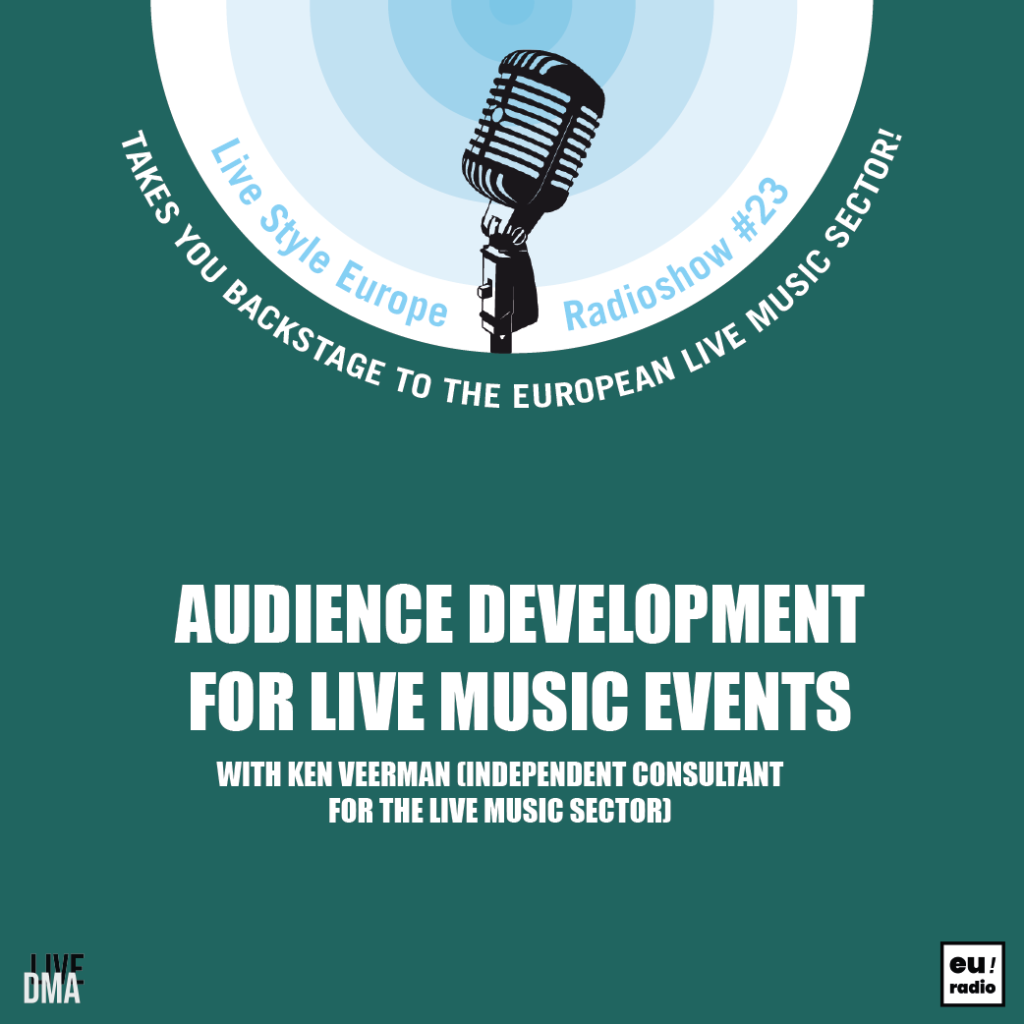
EPISODE 23
Guest: Ken Veerman, Independent Consultant for the live music scene
The ways of conceiving live music events are changing, some live music organisers have at heart to put audience at the center of their events. It is not only the music which matters most anymore. This radioshow dives into this topic with Ken Veerman, which has notably worked on Live DMA’s audience development tool: the Try-Angle.
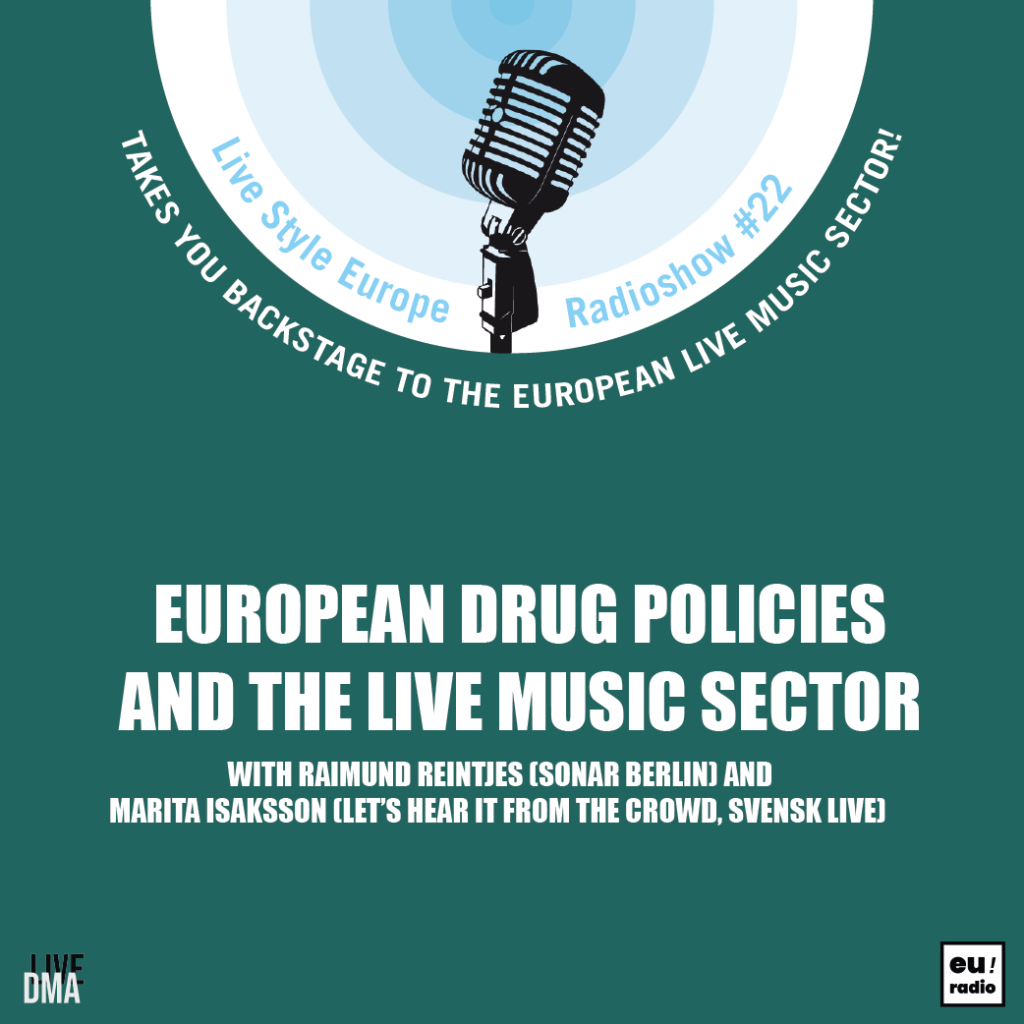
EPISODE 22
Guest: Raimund Reintjes, Sonar Berlin & Marita Isaksson, Svensk Live
Drug Policies are crucial for the live music sector. Many organisations act everyday to prevent the risks linked to the substance use, without posing any moral judgement. This episode will focus on two projects who have a different approach but are still complementary: SONAR Berlin, a drug prevention project and “Let’s hear it from the crowd”, a project by the Swedish live music association which intends to denormalise drug use.
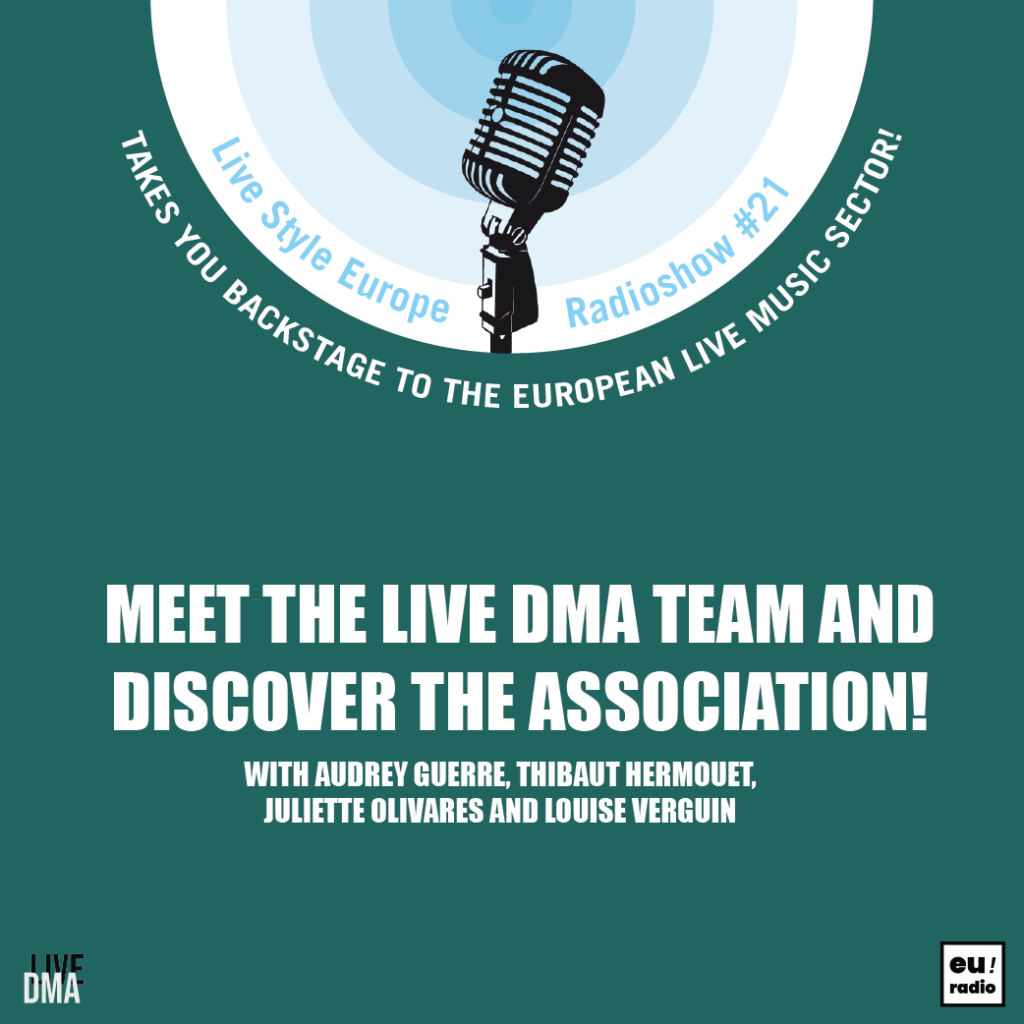
EPISODE 21
Audrey Guerre, Juliette Olivares, Thibaut Hermouet, Louise Verguin
Meet the full team of Live DMA who present the association’s objectives and work during this 21st episode of the Live Style Europe radio show.
LIVE STYLE EUROPE PODCASTS · S1
With over 400 000 music events, 950 000 artist performances and 70 million audience visits in 2017 (Live DMA Survey, 2020), concert venues and clubs are the music sector’s foundation when it comes to artistic creation and the development of new talents.
As part of our What artists say campaign, we asked artists from all over Europe to testify of the important role of these stages for their careers. We are starting a series of 3 radioshows which give the word to 2 artists.
This month, we invite Finnish duo Vildá, winners of the Music Moves Europe Talent Award, to have a chat with us on their relationship with the venues who saw their birth and discuss what it feels like to win an award.
Guests: Viivi and Hildá from the duo Vildá (FI)
With over 400 000 music events, 950 000 artist performances and 70 million audience visits in 2017 (Live DMA Survey, 2020), concert venues and clubs are the music sector’s foundation when it comes to artistic creation and the development of new talents.
As part of our What artists say campaign, we asked artists from all over Europe to testify of the important role of these stages for their careers. We are starting a series of 2 radioshows which give the word to 2 artists.
This month, we invite the Spanish band Melenas, winners of the Music Moves Europe Talent Award, to have a chat with us on their relationship with the venues who saw their birth and discuss what it feels like to win an award.
Interview of Laura Torre, drummer of Melenas (ES)
Music: Melenas – No puedo pensar
This month of March 2021 mark the Covid-19 one year anniversary. It’s been exactly a year since all live music venues are shut down, struggling to survive despite some emergency funds provided by the European governments. Music lovers are painfully missing the warming energy of the concerts and festivals, but, more importantly, the whole ecosystem behind the stage is in danger.
We fear that it becomes difficult to rebuild the sector after the crisis, and we are very concerned about the mental health of the staff working in venues, which continuously need to adapt without any overview of the future.
During this long year, European associations have been working on reopening protocols, calling for a clear vision all around Europe. You can find all of our statements on our website.
This is a global crisis, so what support can The European Union bring to the companies, non-profit organizations and individuals? Culture is a national competence, so how do the European institutions and the Member States collaborate to support the cultural sector?
Gabriele Rosana, Policy Director at Culture Action Europe, answered our questions.
The European music sector is a diverse ecosystem of artists, live music organisers, publishers, not-for-profit organisations and music lovers. The production and enjoyment of music has changed a lot in the past years. In this context, and as part of Music Moves Europe (the sectorial programme from the European Union), the European Commission has recently published two studies to figure out ways to better understand the sector and better anticipate its evolutions in the future through a potential European Music Observatory. One study also focuses on market trends and gaps in funding for the music sector in Europe.
How can we better collect and analyse music sector data? Where is public support missing for the music ecosystem? How feasible is the implementation of a European Music Observatory? We hope to answer these questions today with our guest Fabien Miclet, Independent Consultant in European Strategies who has worked on these two studies.
Access the Feasability study on a European Music Observatory here.
In November 2020, Live DMA was invited by Collectif Culture Bar-Bars, a French association of music clubs and very small cultural venues (mostly bars and cafés with a cultural program), to host a panel about clubculture. The outcomes of this panel, and the many other organized by Collectif Culture Bar-Bars will make up a white paper that will be sent to French authorities (municipalities, ministry of culture) in order to create a set of recommendations for the parts of the live music sector we often forget, unfortunately: the small cultural bars & cafés and the nightclubs or nighttime music activities.
As a European association for live music organisations, our network has a lot of clubs and nighttime activists in it. We will dive further in this scene, often not recognized as being part of the cultural sector by policy makers using extracts from the panel discussion we hosted.
This episodes sums up the main outcomes of the discussions. Our guests were Adriana Alcover from ASACC (Catalonia), Marc Wohlrabe from ClubCommission Berlin and board member of LiveKomm (Germany) and Isabelle Von Walterskirchen, board member of PETZI (Switzerland) and night time actor of the Zurich club scene at Rote Fabrik.
In November 2020, Live DMA was invited by Collectif Culture Bar-Bars, a French association of music clubs and very small cultural venues (mostly bars and cafés with a cultural program), to host a panel about clubculture. The outcomes of this panel, and the many other organized by Collectif Culture Bar-Bars will make up a white paper that will be sent to French authorities (municipalities, ministry of culture) in order to create a set of recommendations for the parts of the live music sector we often forget, unfortunately: the small cultural bars & cafés and the nightclubs or nighttime music activities.
In this Live Style Europe radio show, we explain how live music venues and clubs are affected by Covid-19. Since March 2020, live music venues and clubs had to cancel or reschedule all their events, which is their core business and main source of income.
In some countries, they were able to slowly reopen, however under very strict conditions limiting their regular audience capacity and challenging the usual concert format. With no or only very little activities left, those venues have no income and fully depend on governmental support in order to avoid bankruptcy.
Venues and clubs are part of larger cultural, social, and economic ecosystem. The fact that venues and clubs cannot operate has also repercussions on artists, on the audience, on other music subsectors and all the people working connect to music and live events.
Documents & projects mentioned during the show:
• Key-Numbers – Impact of the Covid-19 Pandemic on 2,600 Live DMA European music venues and clubs in 2020: https://www.live-dma.eu/the-survey/
• Circuito – Recently created live music association in Portugal: https://circuito.live/
• Peaceful awareness campaigns & demonstrations: #WeMakeEvents
• Music: Billy Nomates – No
The show was presented by Elisa Thoma and Juliette Olivares for Live DMA, European network for live music associations.
Every month, the Live Style Europe radio show brings you to the backstage of the live music sector to better understand how it works, listen to the ones who work and fight for great music, and discuss the main challenges they may face.
In this episode you will learn more about Live DMA’s activities: our advocacy work, our capacity-building workshops, Open Club Day or the campaign “What Artists Say!”
We will be talking a lot about concerts, but actually, our job is not to organise concerts and tours around Europe. We work to analyse how the sector evolves, and support people working behind all these stages so you, music lover, can continue to listen or practice the music you like, enjoy a night out, and see your favourite artist or discover new artists live, close to your place! We speak with people working in the music venues and policy makers to make it work in the best possible conditions.
Tune in to learn more about the backstage of the live music sector in Europe!
This radioshow was recorded before the COVID-19 outbreak. The festivals mentionned in this podcast are unfortunately cancelled.
After a focus on horizontal governance by Isabelle Von Walterskirchen, we will dive further into the discussion that took place at the World Health Organisation on “Make listening safe”. Our members, PETZI and LiveKomm were there to represent live music venues, clubs and festivals.
This podcast also presents a follow-up of the Multiannual Financial Framework negociations, the EU budget for 2021-2027.
Tracklist:
- Johan Papaconstantino – Les mots bleus (FR)
- No Me Coman – Pudriendose Por Dentro (CH)
- Some Ember – Towed (DE)
After a few words on the activities we led at Eurosonic Noorderslag Festival in January 2020, the podcast of February 2020 presents the new Facts & Figures of the European live music sector, as presented in our latest Survey publication.
After a focus on the Diversity Roadmap, a tool to accomodate more diversity and inclusion in live music venues, clubs and festivals through an interview of two of their founders, the Swiss music organisations Helvetiarockt and PETZI, we develop further the crucial role of volunteers for live music scenes in Europe.
This radio show also features an interview of Angel Labrusse from IMPALA, the Indepent Music Companies Association.
Tracklist:
- NAAZ – Damage
- Klaus Johan Grobe – KOthek
- Carnival Youth – Akmentii
The first Live Style Europe radioshow of 2020 focuses on advocacy within the European live music sector. Advocacy means “public support for an idea, plan, or way of doing something”. Learn more about how Live DMA advocates for better conditions for the live music sector and the several campaigns we took part in the last few months in the first part of the podcast.
There are other ways of advocating, and everybody can do its part to #SupportYourLocalMusicScene.
Open Club Day is a European-wide event aimed at live music venues and clubs. On Saturday, 1st of February 2020, venues and clubs all around the continent open their doors for free during daytime for the audience to discover these places differently. Through the organisation of a variety of activities (guided tours, disco for kids, panel presentations, workshops, coffee and board games…), clubs demystify the negative stereotypes that may be attached to them and offer people to spend time differently in their club. We had the chance to interview Marcos Vazquez from La Fabrica de Chocolate, a live music club in Vigo, Spain on their participation to the third European edition of Open Club Day.
This podcast also features an interview of Arkaitz Villar from Kultura Live, the live music association for the Basque Country.
Tracklist:
- YĪN YĪN – Dis̄ kô Dis̄ kô
- Atomirotta – Piru olkapäällä
- Alyona Alyona – Завтра
This tenth episode of Live Style Europe focuses on the theme of sustainable development and ecology in the live music sector.
As the European Union has put the fight against the climate crisis as one of its top priorities, and recognized culture as one of the pillars of sustainable development, the live music sector all over Europe initiates projects to implement more sustainable working practices.
At the European level, we took the example of the European Music Council and their commitment towards Climate Action: to develop sustainable behaviours in their work.
We also mention DEMO, a European Cooperation Territory project developing ecology in the music sector. Read our presentation of the DEMO project here!
At national and local levels, we interviewed Esben Marcher from DanskLive on their Green Guide: a guide for concert organizers presenting concrete tips on how to develop sustainable practices when putting up a music event.
We also talked about the Muziekclub 4AD forest and the DIY and ecological philosophy of this music venue which initiated it.
We also focused on FEDELIMA‘s new “Smells Like Green Spirit” campaign, which started with the acquisition of hundreds of stainless steel gourds to supply the French music venues with and help them reduce their consumption of plastic bottles.
Enjoy the podcast!
Tracklist:
- Frustration – Mother Earth in Rags
- FLOHIO – Wild Yout
- Fatboy Slim ft. Greta Thunberg – Right Here, Right Now
In this Live Style Europe radioshow, we will dive further into the topic of gender equality and diversity in the live music sector.
We will first explore the initiatives that are put into place at supra-national levels with an interview with Dagmar Schumacher from UN Women and with Stéphanie Gembarski, from FEDELIMA, who participated in the Voices of Culture programme on “Gender Balance in the Creative and Cultural Sectors“: an international working group to reflect on, analyse and solve the gender inequalities within the cultural sector.
We also mentionned the Keychange programme, funded by the European programme Creative Europe, it is an international campaign which invests in emerging talent while encouraging music festivals, orchestras, conservatoires, broadcasters, concert halls, agents, record labels and all music organisations to sign up to a 50:50 gender balance pledge by 2022.
Then, we explore initiaitves that take place at local levels in Europe, through the inspiring actions and projects from the Live DMA members!
Projects for less gender disparities or gender-based violence for the audience:
- In the Netherlands, the live music association VNPF have won an award for their campaign Ben jé ok? (Are you okay?) which tackles sexual harassment in a positive manner, by inciting people to take care of each other.
- Another campaign which encourages sorority and taking care of others comes from Sweden with their campaign Dare to Care, by the live music association Svensk Live. They have produced resource on the subject (communication campaign, online tests…), and are working to reduce gender inequalities in the Swedish live music sector.
- In Italy, our member KeepOn Live is partner of the Indie Pride association, which aims at giving a space of expression for Queer/LGBTQIA+/Gender minorities artists as well as the audience, focusing on Indie live music to spread their message of visibilisation and inclusion to the world.
- Many other initiatives exist of which our members were partner of, such as the campaign against harassment and discrimination in festivals of the French region Pays de la Loire Ici c’est cool (Here it is cool) that our French member FEDELIMA supports.
Projects working for less gender inequalities for the cultural workers:
- The WAH project by our French member FEDELIMA is a female mentorship project which reunites an “experienced” female music worker and a younger one to exchange on the specific issues women working in music may face. It is also a resource platform to inform people about the inequalities between men and women in the live music sector and the violence women and gender minorities may face.
- Music Venue Trust partners with the PRS Foundation to encourage more young women and gender minorities to break into promoting live music. This programme will provide training, mentoring and practical support to young women and gender minorities who are passionate about live music and want to learn the skills to become an independent promoter. The project aims to offer more opportunities for women, trans and non-binary artists and cultural workers.
- Our member Court-Circuit in Wallonia (Belgium) is also part of the Scivias project, whose goal is to obtain a better representation of women in the live music sector through the artists and the workers.
- In Spain, ASACC is very active in the Mujeres en la Industria de la Musica (MIM) project, which aims to sensibilize and visibilise the conditions of women working in music. We have already talked about this project in our radioshow from October 2018, check it out if you are interested!
- In Switzerland, PETZI have worked on the Diversity Roadmap, a tool aimed at live music venues and clubs, for them to reflect on their working practices: representation of women and other minorities on their stages, how their working team is composed to represent all sensibilities and experiences… They have partnered with many Swiss associations that work for better equality and diversity in the music sector (We Can Dance It, Helvetiarockt…) It is truly a good, simple and efficient tool ! The Diversity Roadmap is now available in English!
This episode also presents LiveFIN, the live music association in Finland.
Tracklist:
- Maydar – Sweet Talk (IKAT remix) (Sweden)
- NUBLU – Muusikakool (Estonia)
- Big Joanie – New Year (UK)
The Live Style Europe radioshow is back for a second season on Euradio! In this episode you will learn more about Live DMA’s activities: our advocacy work, our capacity-building workshops and the Open Club Day! We also had the chance to talk on the phone with Arne Dee, who coordinates the Survey, a data study of live music venues and clubs part of the Live DMA network. Tune in to learn more about the backstage of the live music sector in Europe!
Tracklist:
- Tribade – Mujeres
- Molchat Doma – Tancevat
- Camilla Sparksss – Europe
- Contini – Complimenti
For the last Live Style Europe radio show of the season, we would like to look back on the second year of the Live Style Europe project and project ourselves in the future by presenting our upcoming activities.
In 2017, the European Commission granted Live DMA with the European network funding via the Creative Europe programme in order to develop its project Live Style Europe: a capacity-building programme that aims to empower regional and national live music associations, as well as music venues, clubs and festivals by providing them with skills and tools for an easier adaptation to the evolution of the live music sector. It is the core of Live DMA’s activities, and we are now entering the third year of the project.
This radio show also presents one of Live DMA’s members: Court-Circuit in Wallonia and Brussels (Belgium) as well as the next events we will attend:
- KeepOn Live Fest, 12th & 13th of September 2019, Rome (Italy)
- Reeperbahn Festival, 18th to 21st of September, Hambourg (Germany)
- 6th World Forum on Music by the International Music Council, 28th of September to 1st of October, Paris (France)
- BIME Pro, 30th of October to 1st of November, Bilbao (Spain)
Music:
- Sweat Like an Ape! – Witch
- Blu Samu – Sade Blu
- Kompromat – De mon âme à ton âme
- Hyperculte – Temps Mort
April’s LSE podcast focused on two campaigns run by Live DMA:
The 2019 European Parliamentary elections’ campaign, for which Live DMA has prepared an advocacy plan to raise awareness among European officials on the particularities of the sector, based on the principles defined in the 2005 UNESCO Convention on the Promotion and Protection of the diversity of cultural expressions and the 2007 Fribourg Declaration on cultural rights.
Among the various actions Live DMA runs for this campaign, the release of our statement Amplifying the Added Value of Live Music Scenes for Europe provides concrete guidelines and wishes from the live music sector that we represent. Read the full statement here.More information about Live DMA’s campaign here.
We also had the chance to talk Cultural Rights and international cooperation with Laura Aufrère, a French Phd in Management, Lab of Economy (Paris 13, St Denis University) working on the solidarity and social economy and the commons.
We released a communication campaign What Artists Say where we invite artists to talk about the support provided by small-sized venues for their careers. Discover how artists support European live music venues & clubs here.
Music:
- Triangulo de Amor Bizarro – De la monarquia a la criptocracia
- Girls in Hawaii – Walk
- The Hearing – Everyday
In this fourth episode of the Live Style Europe radio show:
- Release of the Live DMA Online Resource Platform in December 2018.
- Short feedback on Live DMA’s activities at Eurosonic in January 2019.
- Interview with Arne Dee from VNPF, Live DMA’s member in the Netherlands
- Interview with Susann Hollmann, Deputy Head of the Cultural Policy Unit in DG EAC of the European Commission, about Music Moves Europe
- Updates on latest Music Moves Europe news and focus on Live DMA’s involvement in Music Moves Europe:
>> Structured Dialogue, Post on Live DMA website
>> Live DMA’s recommendations for the future of the Creative Europe programme
>> Feasibility study on a potential European Music Observatory
>> Music Moves Europe Talent Awards
- Interview with Marjan Dewulf from the venue 4AD located in Diskmuide in Belgium about the venue’s project towards a committed and ecological venue
>> Info on DEMO project
- Agenda on upcoming Live DMA activities:
>> Open Club Day on Saturday, 2nd of February
>> European Music Council’s reception at the European Parliament on the 18th of February
>> Live Style Europe working group “Music is no noise” from 20th – 21st of February
Music:
- Presseys – On the run
- La Fraicheur – The Movements
- Arp Frique – Nos Magia
– Interview with Marc Steens from Clubcircuit, one of our two members in Belgium
– Feedback on the first session of our Live Style Europe working group “Music is not noise”
Information mentioned:
- World Health Organisation noise guidelines for the European region
- Live DMA Resource Platform:
– Interview with Thore Debor from Clubkombinat Hamburg about Fair-Tix, an alternative ticketing solution
– Live DMA will attend the following events in March:
Pop Mind, Rouen, France – conference on the topic of fundamental human rights coorganized by Fedelima:
MIL, Lisbon, Portugal – showcase festival and conference:
Music:
- Joost – Meeuw
- Brutus – War
- Pongo – Kuzola
In this third episode of the Live Style Europe radio show:
- Feedback on Audrey’s participation at a panel on the latest evolutions of the Creative Europe programme at the Transmusicales Festival in Rennes
- Interview with Benjamin Freaigneau, in charge of communication & of circulation of information at Fedelima – Live DMA member in France.
- Fedelima’s latest study on employment
- The focus topic of this show was the second European edition of the Open Club Day – a joint European event happening on Saturday, the 2nd of February 2019 all over Europe
- To participate at the Open Club Day, follow the link of the registration form.
- Interview avec Alex Bücheli, founder of the Open Club Day and director of the bar & club commission in Zürich (BCK), Switzerland
- Interview with Aurélie Caraforra, responsible of programming and community projects at the venue Emmetrop in Bourge, France about their participation at the Open Club Day in 2019
- Launch of the outputs and tools developed during the two year project STAMP – Shared Training Activities for Music Professionals with the European Music Council
- Online course on international cooperation & networking
- Interview with Ruth Jacobi, Secretary General of the European Music Council
Music:
- Presseys – On the run
- La Fraicheur – The Movements
- Arp Frique – Nos Magia
In this second episode of the Live Style Europe radio show:
- Interview with Victor and Zivile Diawara, the two founders and directors of LOFTAS, music venue and cultural fabric in Vilnius, Lithuania
- Interview with Marc Wohlrabe, co-founder of the Berlin clubnetwork Clubcommission, board member of the German live music network LiveKomm, curator and co-founder of NIGHTS & Stadt nach Acht conference, about the importance of setting live music venues and clubs in the context of transversal issues such as nightlife and urban development.
- Interview with Søren Merrild Staun, the project adviser of Puls – a cooperation project on artistic circulation in the Nordic countries.
Live DMA December Agenda:
Conference in Transmusicales Festival in Rennes (7.12.2018)
Music:
- Happy End Less – Paryciai (Lithuania)
- Slow Sliders – It’ Hard to Hate (France)
- Regina – Paivat valuvat (Finland)
In this first episode of the Live Style Europe radio show:
- Focus on Live DMA’s activities at Reeperbahn festival in Hamburg, Germany (19. – 22.10.2018)
- Presentation of the study conducted by EventKultur Rhein-Neckar, local live music network in Germany, Pop-Akademie Baden-Wûrtemberg, and Digitale Hochschule Baden-Würtenberg
Link to the study „Veranstaltungswirtschaft in der Metropolregion RheinNeckar“ (German) - Interview with Karsten Schölermann, president of Live DMA’s German member LiveKomm, on the associations current activities and challenges
- Interview with Carmen Zapata, coordinator of Live DMA’s member in Catalonia Asacc and president of the association MiM (Mujeres de la industria de la musica) on initiatives that tackle the gender gap in the music industry
- Resources mentioned on gender policies in the music industries:
Index of initiatives, studies, and resources provided by the Music Cities Network
Employment study co-conducted by la Fedelima (Live DMA’s member in France), le RIF (network for music organisations in Paris), and OPALE (resource centre) “l’emploi permanent dans les structures de musiques actuelles” (French)
IASPM journal on Gender Politics in the Music Industry published by the International Association for the Study of Popular Music
- Interview with Edlef Heeling, project manager of the Music Moves Europe Talent Awards
- Live DMA November Agenda:
NIGHTS conference in Brussels (15-17.11.2018)
Slash convention in Nantes (22 – 23.11.2018)
STAMP event in Budapest (27 – 29.11.2018)
Music:
- Brett – ein schöner Tag
- Smerz – because

